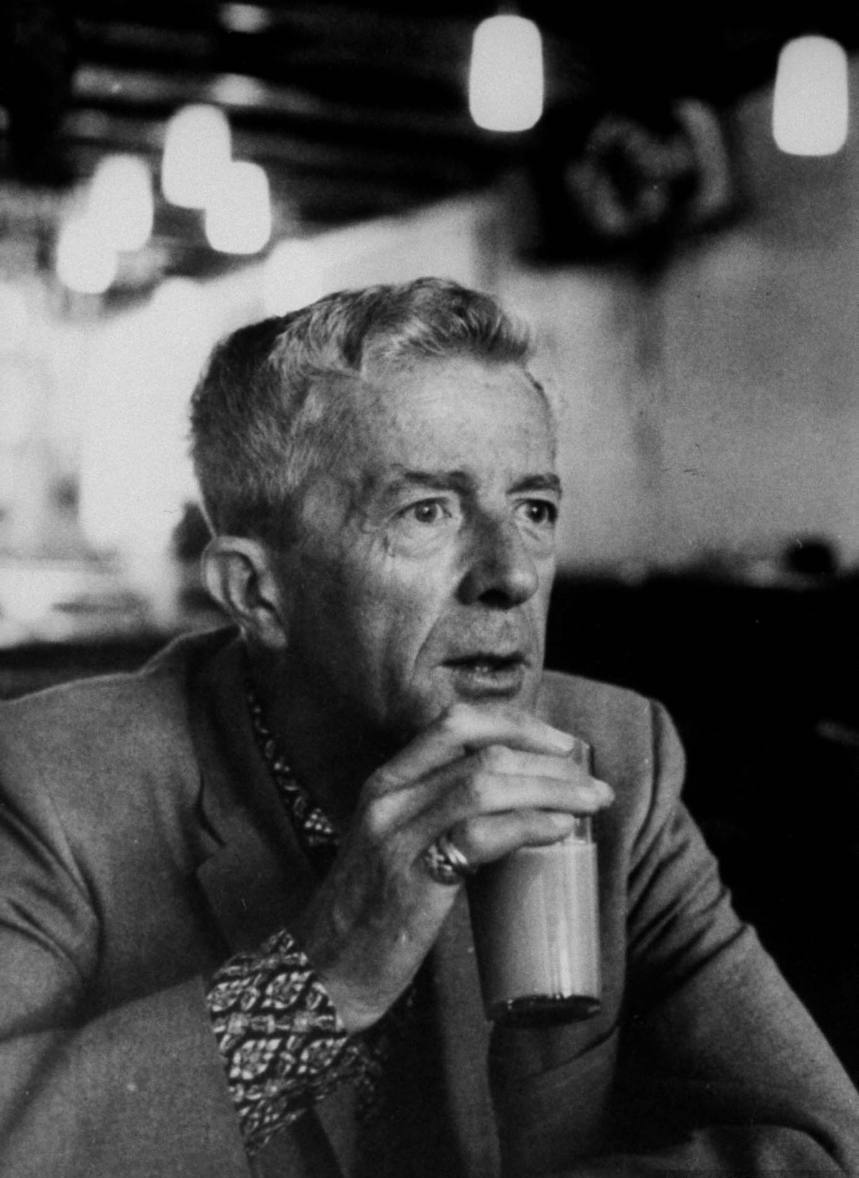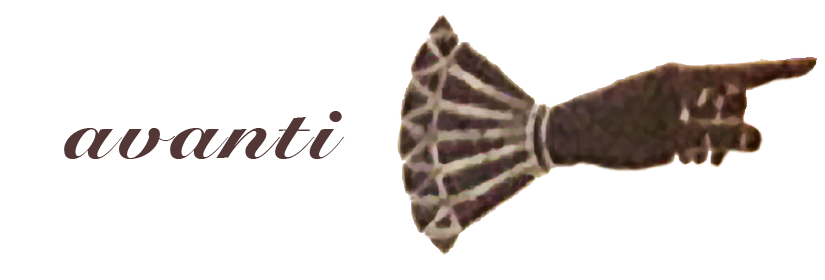More Pages From Cold Point. Tangier
Genoa. Eight o’clock ekes an invisible class system out of the human contraband that came aboard secreted in cars and trucks. The à la carte restaurant is open, and here, suddenly, as if from nowhere, are the Europeans. We’ve been unseen till now, prinking cabins, flushing ensuite toilets, wringing the last shreds of business out of a fading onshore signal. Despite departing from Italy none of us are Italians. Belgians, Scandinavians, Dutch, one elderly American couple, vegetarians. It’s all very Graham Greene. There are perhaps twenty of us. A litter of men traveling alone, a table of Germans, only five, but with an aura of entitlement twice the size. Tanned, they slouch in chairs, order with the patrician confidence of Prussian barons or tax advisors; yet (in a sign of the times) instead of epaulets and plumage, they are clad head to toe in Lycra and Gore-Tex, olive greens and gunmetal greys. They will be coming home on catamarans, windblown twin-hulled past the Azores. There are no North Africans here. An Arab man behind me, confused, stumbles in, is intercepted by the waiter and redirected to the cafeteria. “You won’t be happy here.” He smiles, nods, grateful to be free of us, the dread pall of our sheepish Anglosaxon munching.
I’ve done these long-haul Grandi Navi voyages a few times. Civitavecchia to Tunis, Tunis to Genoa, back and forth like a waterbeetle from Naples to Palermo. But never the big one: the sixty-two hour leviathan to Tangier, surfacing only at Barcelona to evacuate your blow-hole. I’ve eyed it from the bars and osterie that tumble down to the port like litter, in my linen suit and panama, tapping an unfiltered sobranie on the back of its silver cigarette case (inscribed from Rita, long nights in Tripoli) while I waited for that shipment of salted codfish and ball-bearings from Dar es Salaam. Another citron pressé, Mustafa, and don’t skimp on the Ricard. I’ve seen the thin trickle of foot-passengers scurry like ants, first this way then that, leery of traversing the no man’s land between the terminal and gaping maw of the ship’s anus lest they be fried by some heavenly magnifying glass. And always freaks. The lardy, terminally pink couple who bicker, their bodies absorbing their backpacks in some slow, enzymic peristalsis. The ancient Canadian mummies, dry as parchment, with walking poles and trousers that peel into shorts, who never speak but catch flies with their tongues.
And now me. In gondolier pants and braces, linen shirt untucked, battered knotted-paper hat from Kadikoy. Estragon after Vladimir fucked off.
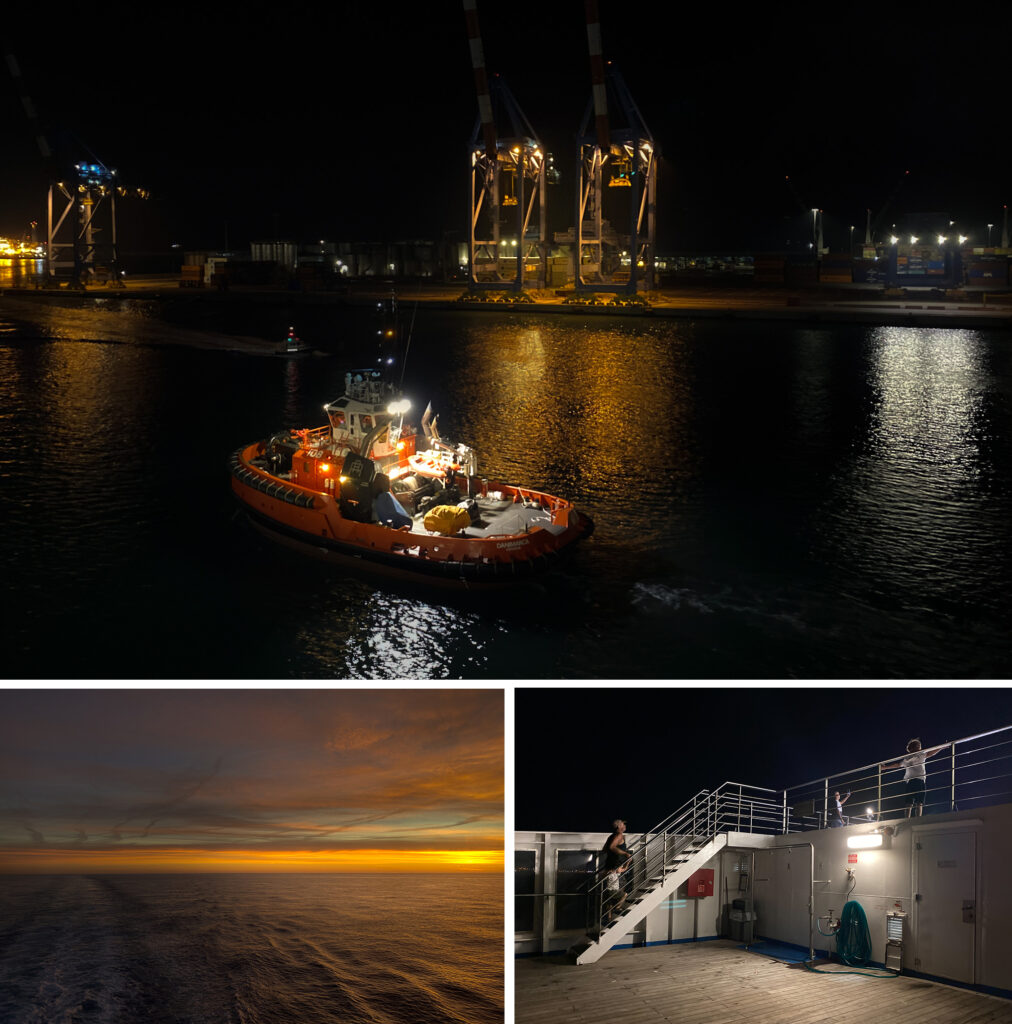
Genoa’s gone. Early morning at sea off Oran. Albert Camus was from Oran, played goalkeeper for Racing Universitaire d’Alger in the early 30’s, before the birds, booze and fags got him. “Everything I know about morality and the obligations of men, I owe it to football.” I’m up top near the funnels, doing selfies with two plastic chairs and Greene’s The Comedians. Venice feels a whole lifetime ago, there’ll be nothing but pigeons in Campo Sant’Agnese now, and the quotidian whoosh of besom on cobbles. The pool on the back deck is closed, empty, its blue hole netted to deter the ghosts of long-dead revelers, those holidaymakers and English soccer fans they planned for, the coachloads of schoolchildren who never came. Still, a blue lagoon would have been wasted on these Arab truck drivers, sober and unswerving in their chatter, who wouldn’t dream of pausing baloot marathons to peel off and enact a nefarious cannonball. They’ve been up since dawn, their campsites in corridors, lobbies, heads and tails of stairs, now folded and set aside for the daylight hours. They’re back to where they’ll be all day; the plastic tables that surround the stillborn pool, smoking, slapping down cards, drinking tea and water from tiny paper cups, setting their companions and the world to right in timeless tones of umbrage, amazement and dismay.
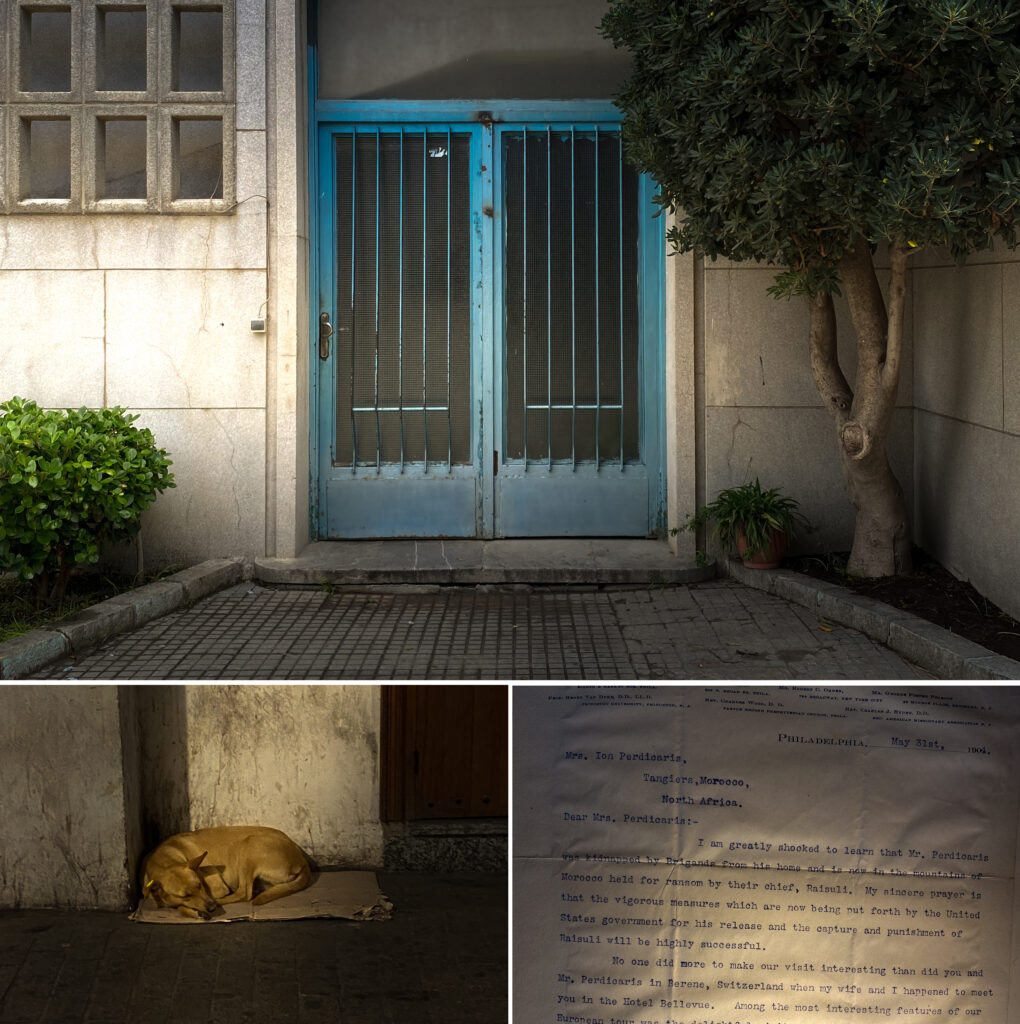
You’d think Paul Bowles’s place would be some hubble-bubble joint deep in the medina, in a nook at the foot of the kasbah, an old wooden door, the green paint flaking and faded, rap three times on the camel-foot knocker and wait? Inside, a winding staircase, like in a minaret, how many floors up have you gone, suddenly cool, the past the corridor to the room where the old woman makes tea, finally emerging into the old devil’s eyrie, all pitched fabrics, books, rugs, a divan?
No. Inmeuble Itesa is a grey, freestanding block in an even greyer part of town a couple of kilometers beyond anything that could be imagined exotic. Picture, for instance, a faceless municipal building for storing tax records, or a very low-security prison. There’s a modern sandwich bar at street level (Snack Lampedusa) and a video-game shop. The term nondescript would flatter it. The windows are recessed behind honeycombed concrete, giving the whole edifice an impression of not having windows, more like lots of eyebrows, all frowning. This is where the alchemist of The Sheltering Sky, Pages from Cold Point and Let It Come Down lived for thirty-nine of fifty-two years in Tangier, in a small apartment, tended to by his friend Mrabet and a succession of long-stay hangers-on. His wife, Jane, lived with him too, only moving into a second apartment directly beneath when alcoholism, epilepsy and her obsession with her notoriously beastly lover Cherifa – an illiterate Moghrebi woman with several gold teeth, a promising moustache and a passion for booze and black magic – became too much for one place to handle. Paul suspected Cherifa systematically poisoned Jane to get her money, causing a near-fatal stroke. “Cherifa carries a switchblade always, in order to castrate any male who may say good evening to her. Never knew a woman who hated men so violently. And always I’m more appalled by her than before.” It was as if he had been assigned the apartment by the Witness Protection Programme.
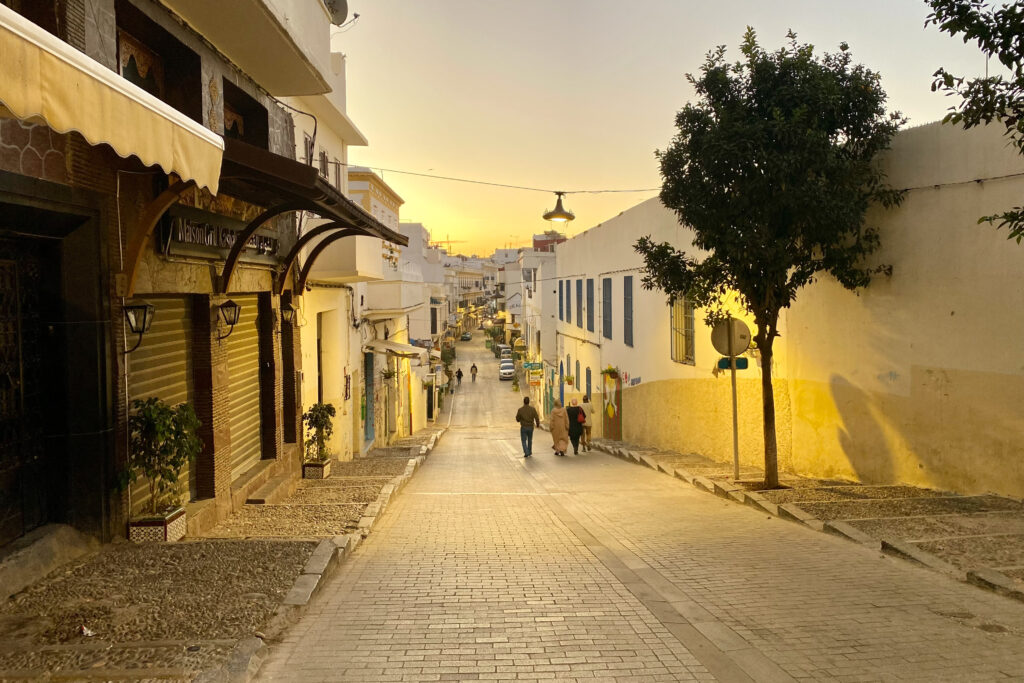
Morning in the Grand Socco, perched on a bench outside Cinema Rif, he watches the first of the day’s endeavours unfurl, stagehands preparing the set for a play that has run and run and will run some more. Already the policeman in full regalia, taller, fatter, whiter than any of his charges, toots his whistle, conducts and points like a maestro. The air smells of hot metal and burnt hair. Everybody’s weary. ‘What, this again?’ they seem to say. It is real to everyone, but not to him. He is not afforded that privilege. Placelessness has put him at the periphery of actuality. It is as if everything he touches remains unmoved by his touch. His friend said there are angels who pass amongst us unseen, fingering the glasses, the fake oil lamps and wax apples. Or ghosts. The actors flinch, swat at a fly, then go about their preparations. Charring the skin from a goat for the briar. What should have been purgation – to be outside of life – feels like affliction. Present, yet absent, each new room, piazza, market, each flyblown town different, yet always the same town.
There is an evening coming in
Across the fields, one never seen before,
That lights no lamps.
Silken it seems at a distance, yet
When it is drawn up over the knees and breast
It brings no comfort.
Where has the tree gone, that locked
Earth to the sky? What is under my hands,
That I cannot feel?
What loads my hands down?
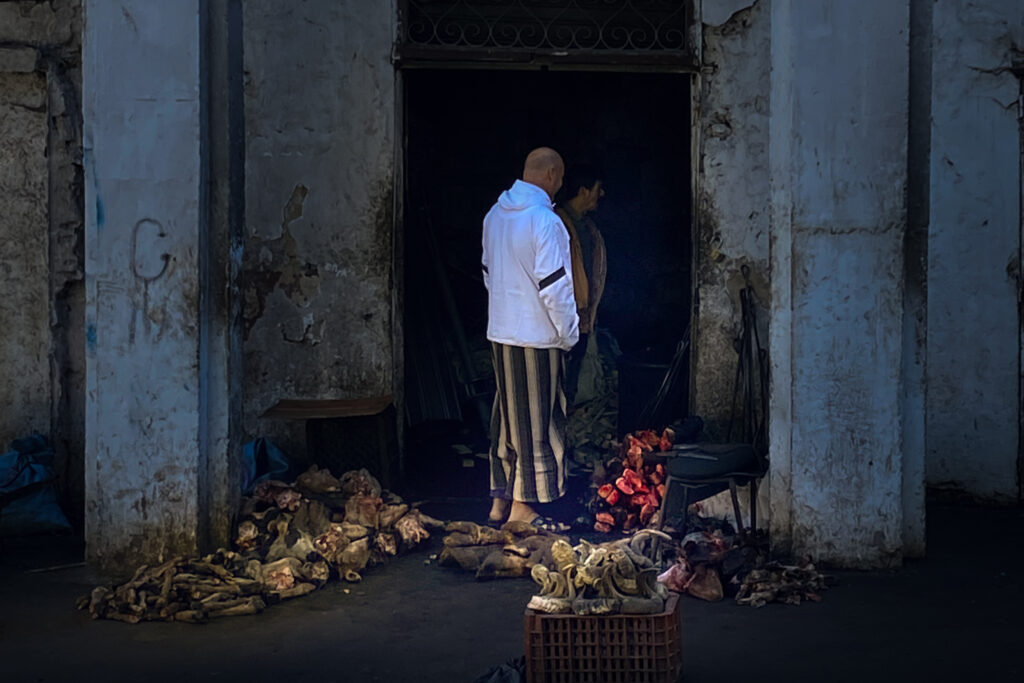
At Café Hafa in the winter sun you can hear your atoms decaying, shedding skin, turning back into the universe. Late morning. If you squint tightly you can make out Barbate or Tarifa, tiny knuckles of Europe crouched across the strait. No smell of burning hair up here, just salt, sweet peppermint tea, the first light blows from the hammer of the sun. I’m suppressing nausea commensurate with a hangover glare, despite not having a hangover. No booze here, not for two weeks, still it looks like a hangover feels. I know the etymology of this sensation. When you’re sick but don’t yet know it. Just another old white guy on a bench wincing behind sunglasses. Today will be a nervous one, anticipating a long night crouched upon a toilet like the thinker, the smell of incense cloying and impossible. Tomorrow the sorrowful crawl to the Red Crescent for a prescription. There’s only a couple of dispensaries open on a Sunday, cluttered and businesslike on roundabouts at the fringes of town, proferring simples like communion to the gastrically penitential. Being unwell is always a reminder that its time to be off. I’ll shuffle to the station, book a train to Casablanca. Soon the day will soften, caramelize into roasting flesh, the stuff of a thousand hastily taken lunches. And the fear will subside; I’ll be okay after all. Last week, on the ship off Marseille, her hand reminded me of Ann’s hand. Or rather her hand reminded my hand. My hand didn’t know that Ann was dead and twenty years had passed.
It’s like in that Jack Gilbert poem when he says, ‘we must risk delight.’ He’s so right. And it is a risk, because in the face of so much hideousness, every crevice of the world seething with it, beaming like a Mormon risks coming across as rude, not to mention demented and a bit fucking annoying. Like some snorting horse-toothed aristocrat, untouched by the horror. Yet everybody I meet seems into it, the connection, it’s like magic. Engage and shit happens. Taking somebody’s hand is cool. It’s being momentarily, exclusively eye-to-eye with a person. Holding a stranger’s hand for a few moments while they’re holding yours. Just the two of you in the whole teeming world. Saying “I see you,” no matter how fucked up stuff might be. How great is that? ‘We must admit there will be music despite everything.’
In the dream there was another morning, and you were in your coat outside, already loping along on some errand, and there was a dryness around the bruise of your mouth, a flash of remorse in the wet of your eye; before you smiled again from behind the curtains of your French girl hair, lit a cigarette and the world was perfect. There is no new wave, only the sea.
•••
